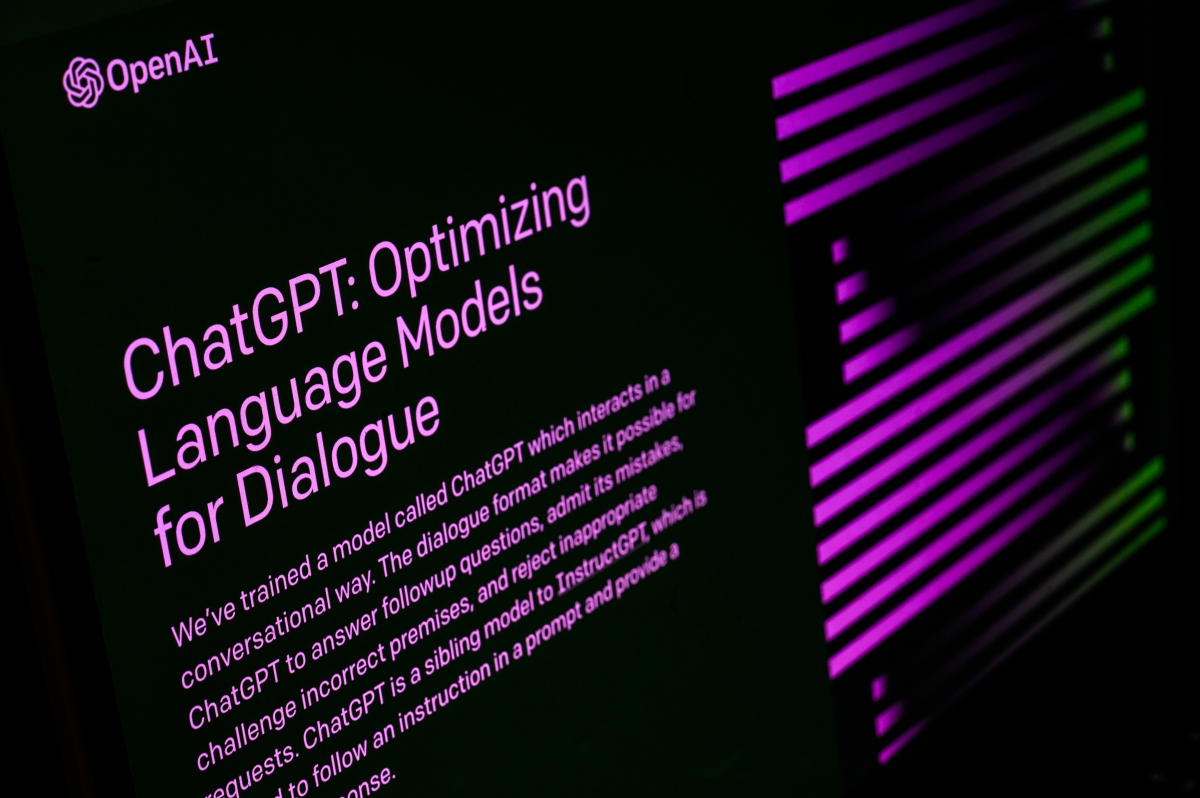OpenAI's ChatGPT Under FTC Scrutiny: A Deep Dive

Table of Contents
The FTC's Concerns Regarding ChatGPT's Data Practices
The FTC's investigation into OpenAI's ChatGPT centers heavily on its data practices. Concerns regarding data privacy and security, as well as the presence of algorithmic bias, form the core of this scrutiny.
Data Privacy and Security
ChatGPT's impressive capabilities rely on vast amounts of user data. The FTC is concerned about how OpenAI collects, stores, and uses this data, raising questions about potential violations of privacy laws like GDPR and CCPA. The lack of complete transparency in data handling practices further exacerbates these concerns.
- Potential for Data Breaches: The sheer volume of data handled by ChatGPT presents a significant vulnerability to potential breaches, potentially exposing sensitive user information.
- Misuse of Personal Information: Concerns exist regarding the potential for misuse of personal data collected by ChatGPT, either through accidental leaks or intentional malicious actions.
- Lack of Transparency: The lack of clear and comprehensive information about data handling practices makes it difficult for users to understand how their data is being used and protected. This opacity fuels distrust and raises significant ethical questions.
Algorithmic Bias and Discrimination
Another critical area of concern for the FTC is the potential for algorithmic bias in ChatGPT. The model is trained on massive datasets, and if these datasets contain biases, ChatGPT can perpetuate and even amplify them, leading to discriminatory outcomes.
- Biased Outputs: Examples have emerged where ChatGPT produces outputs reflecting gender, racial, or other societal biases present in its training data.
- Impact on Marginalized Communities: These biases can disproportionately affect marginalized communities, perpetuating existing inequalities and further marginalizing vulnerable populations.
- Mitigating Bias in Large Language Models: Addressing bias in large language models like ChatGPT is a complex challenge, requiring careful curation of training data and ongoing monitoring of the model's output.
OpenAI's Response and Future Actions
OpenAI has responded to the FTC investigation, but the specifics remain largely undisclosed due to the ongoing nature of the process. Understanding their stance and potential future actions is crucial to evaluating the situation.
OpenAI's Stance on the FTC Investigation
OpenAI has publicly acknowledged the FTC investigation and expressed a commitment to addressing concerns about data privacy and algorithmic bias. However, the details of their defense and specific actions remain largely confidential at this stage.
- OpenAI's Defense: OpenAI’s official statements generally emphasize their commitment to responsible AI development and their ongoing efforts to mitigate the risks associated with their technology.
- Steps to Address FTC Concerns: OpenAI is likely undertaking internal reviews and implementing changes to their systems and practices to address the FTC's concerns. The exact nature of these changes is yet to be publicly revealed.
- Commitment to Responsible AI Development: OpenAI's public statements repeatedly highlight their commitment to developing and deploying AI responsibly, suggesting that they are taking the investigation seriously.
Potential Changes to ChatGPT's Functionality and Policies
In response to the FTC's investigation, OpenAI may implement significant changes to ChatGPT's functionality and policies to enhance data protection and mitigate bias.
- Improved Data Privacy Controls: Enhanced data encryption, more granular user controls, and improved data anonymization techniques are all potential changes.
- Enhanced Bias Detection and Mitigation Techniques: OpenAI might incorporate advanced algorithms and human oversight to detect and mitigate biases in ChatGPT's output more effectively.
- Increased Transparency in Data Handling: Improved documentation and user-friendly explanations of data collection, storage, and usage practices could build user trust and satisfy regulatory requirements.
The Broader Implications of the FTC's Scrutiny of ChatGPT
The FTC's investigation into OpenAI's ChatGPT has far-reaching implications, setting a potential precedent for AI regulation and impacting the future of conversational AI.
The Precedent for AI Regulation
The FTC's actions could establish a crucial precedent for the regulation of AI technologies globally. This could shape the development and deployment of future AI systems.
- Potential Impact on Future AI Systems: The outcome of the investigation will significantly influence how other companies develop and deploy AI systems, potentially leading to stricter regulations and increased scrutiny.
- The Role of Regulatory Bodies in Shaping the AI Landscape: Regulatory bodies like the FTC are increasingly playing a key role in defining the ethical and legal frameworks governing AI development and use.
The Future of Conversational AI
The FTC investigation will likely influence the development and future of conversational AI, potentially leading to limitations on functionality and a greater emphasis on ethical considerations.
- Potential Limitations on Functionality: Increased regulatory scrutiny may lead to limitations on the capabilities of conversational AI systems to ensure data privacy and prevent misuse.
- Increased Emphasis on Ethical Considerations: The investigation underscores the importance of incorporating ethical considerations into every stage of AI development, from data collection to deployment.
- Changes in User Expectations: Users may become more aware of the ethical implications of conversational AI, leading to increased demand for transparency and accountability.
OpenAI's ChatGPT and the Path Forward
The FTC's scrutiny of OpenAI's ChatGPT highlights the critical need for responsible AI development and robust regulatory frameworks. The investigation's outcome will significantly influence the future of AI, setting precedents for data privacy, algorithmic bias, and the broader ethical considerations surrounding this transformative technology.
Key Takeaways: The main concerns highlighted include: potential violations of data privacy laws, the perpetuation of algorithmic bias, and the lack of transparency in data handling practices. These concerns have far-reaching implications for AI regulation and the future of conversational AI.
Call to Action: Stay updated on the latest developments in the OpenAI ChatGPT FTC investigation and contribute to the responsible development of AI by engaging in informed discussions and advocating for ethical AI practices. For more information, visit the FTC website [link to FTC website] and OpenAI's blog [link to OpenAI blog].

Featured Posts
-
 Vehicle Subsystem Issue Forces Blue Origin To Cancel Rocket Launch
Apr 23, 2025
Vehicle Subsystem Issue Forces Blue Origin To Cancel Rocket Launch
Apr 23, 2025 -
 Vetrine Spaccate La Protesta Di 200 Persone Contro L Attacco Ai Ristoranti Palestinesi
Apr 23, 2025
Vetrine Spaccate La Protesta Di 200 Persone Contro L Attacco Ai Ristoranti Palestinesi
Apr 23, 2025 -
 Les Meilleurs Seuils Techniques Pour Une Alerte Trader Efficace
Apr 23, 2025
Les Meilleurs Seuils Techniques Pour Une Alerte Trader Efficace
Apr 23, 2025 -
 Istanbul Okullari Pazartesi Kapali Mi
Apr 23, 2025
Istanbul Okullari Pazartesi Kapali Mi
Apr 23, 2025 -
 Survey Shows Fewer Canadians Seeking Us Relocation Under Trump Administration
Apr 23, 2025
Survey Shows Fewer Canadians Seeking Us Relocation Under Trump Administration
Apr 23, 2025
